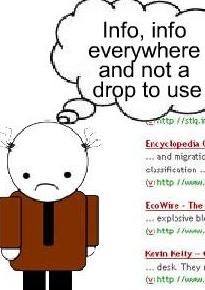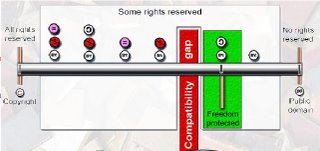 Over the past few weeks, I've been subscribing to an UNESCO list-serve discussion on the development of a "Do It Yourself" guidebook for open educational resources. One of the participants, Professor Derek Keats, raised an interesting discussion on the different Creative Commons licenses and the distinction between what he calls "open materials" and "free materials". Derek created this flash animation to explain the
Over the past few weeks, I've been subscribing to an UNESCO list-serve discussion on the development of a "Do It Yourself" guidebook for open educational resources. One of the participants, Professor Derek Keats, raised an interesting discussion on the different Creative Commons licenses and the distinction between what he calls "open materials" and "free materials". Derek created this flash animation to explain thedifference and to encourage educators to release their materials without the non-commercial restriction.
At first, the non-commercial restriction seems like a fair compromise: the materials are made available while remaining safe from leeches wishing to profit off your work. In the long run, however, Derek believes that any restriction impedes the free flow of materials and ideas within a system. For instance, while I may feel like I'm making my materials available but student can't turn my materials into a play and sell tickets. Publisher who can't reach me won't be to adapt the materials. Ultimately, these materials tend to fall to the wayside while truly free materials continue to flourish.
From personal experience, I can see the effect of impediments in the images I select from sxc.hu. While it's not much work to inform and thank photographers for their images, I tend to pick the pictures that don't require this formality. By placing this example in a larger context, one can appreciate the effect of even the most minimal restrictions in the flow of information. Think about the success of Wikipedia - sure there are some leeches trying to copy the entries and make a quick book. But compare that small negative in comparison to the success of the project.

So check out the animation and come up with your own opinions. The creative commons movement has been very positive and it's great to see so many educators making their materials available. However, the knee-jerk reaction to keep the work non-commercial might be a larger disservice than it seems. If you want to foster the "rip, mix, learn", don't impose restrictions, even if they, at first, seem reasonable. How can you anticipate what someone might want to do with your stuff?
To view the presentation, click on this link and choose "Free and Open Resources for Education" from the View box on the bottom-left of the screen. Next, select "Prof Derek and the NonCommercial Restriction on Freedom in Educational Content". Also, here's the link to the UNESCO IIEP Virtual University projects and lists.





No comments:
Post a Comment